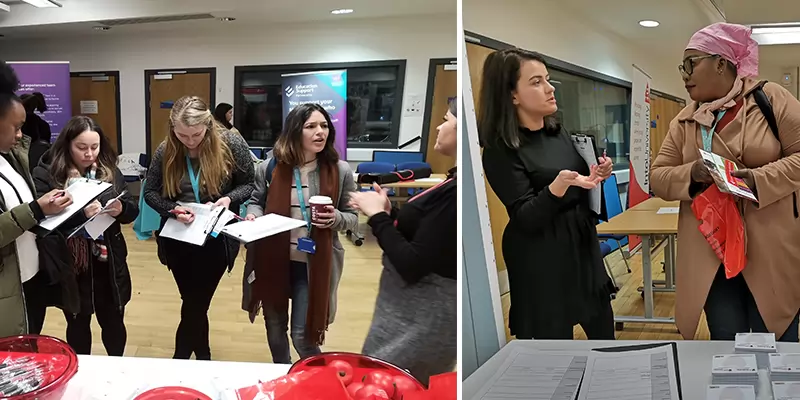Maths Teacher Jamie Frost from South-West London has won a Covid Hero Award after his free tuition website helped students around the world study during the Covid-19 lockdown.
Jamie Frost, who works at Tiffin School in Kingston upon Thames, received a one-off prize £33,000 for going above and beyond in the coronavirus crisis to help keep pupils learning.
He was one of 10 finalists shortlisted for the sixth annual Varkey Foundation Global Teacher Prize.
His Dr Frost Maths tuition website that he runs from home had more than million-page views a day when schools shut amid Covid-19 and has had more than seven million teaching resource downloads. His online learning platform is funded by the Mayor of London's office, free to use and used worldwide.
The ceremony was broadcasted virtually from the Natural History Museum in London, actor Forest Whitaker announced that Mr Frost had been awarded special recognition.
On receiving the Covid Hero Award, Mr Frost said: “I feel absolutely fantastic”.

“It’s such an honour to receive this award and I’m just so happy that so many students have been able to benefit from my site, and that’s what I want really.”
Mr Frost was selected from more than 12,000 nominations and applications from over 140 countries for the Global Teacher Prize.
In a video message, Whitaker said: “Your creativity and dedication have illuminated millions of minds for free. Thank you, Jamie. Thank you to all the world’s teachers.”
Despite not achieving the pass mark for his 11-plus exams, his own maths teacher knew he was able and would often let him get on with his own work while in the classroom. He had attended sixth form at Tiffin School, where he currently teaches, and took up the opportunity when offered work experience there.
While studying for his PhD in computer science he realised that he wanted to go into teaching when helping to educate undergraduates.
He told The Times that he 'hated' working in the banking sector, saying:' I was working on trading strategies for bond traders. 'I was just helping an institution with loads of money make more money. It wasn’t a very good feeling.'
Prime Minister Boris Johnson said in his video message, Mr Frost’s “ingenuity” had “given hope and support to millions of children throughout the world”.
Mr Johnson added: “It’s been incredible to see how teachers have adapted to home learning and used technology to continue with lessons throughout the pandemic.
“You don’t just represent the heroic teachers in the United Kingdom but also across the whole world.”
Education Secretary Gavin Williamson said: “I would like to send my warmest congratulations and thanks to Jamie for his outstanding innovation and dedication in helping pupils and fellow teachers around the world.
“It is a truly remarkable story, and I am pleased he is receiving the worldwide recognition he thoroughly deserves.”
Million-dollar prize
Comedian and actor Stephen Fry announced the main prize of £1million went to Ranjitsinh Disale, a village primary school teacher from India who was praised for improving the education of girls.
He started teaching at the school in 2009, when it was in a rundown building next to a cattle shed, according to organizers. School attendance was low and teenage marriage common. He also provides online science lessons for pupils in 83 countries and runs an international project building connections between young people in conflict zones.
Prize organisers said he was honoured for having "transformed the life chances" of girls at the Zilla Parishad Primary School in Paritewadi, in Maharashtra state.

In his winning speech, Mr Disale said he would share half of the prize money with the nine runners-up in the competition - the first time the Global Teacher Prize winner has done this.
Andria Zafirakou has been the only British winner of the million-dollar prize. In 2018, she won the prize for her work as the deputy headteacher at Alperton Community School in Brent, West London.

At the time, she said: “At the end of the day, it's all about the kids and giving them the opportunities to find the best of themselves.” “Anything is possible.”
Founder of the Varkey Foundation, Sunny Varkey that set up the teachers' competition, said "by sharing the prize you teach the world the importance of giving".
Mastering Teacher job interviews via video apps
Video interviews through applications such as Skype, Zoom, Facetime and many others are hugely popular at the moment. The majority of schools still require vacancies to be filled when schools do finally reopen and not forgetting those recently graduated students looking to complete their NQT year from September. Whilst current social distancing restrictions are in place, telephone and interviews will remain in place. Because of this, it's now more important than ever to make sure that your telephone and video interview skills are up to scratch.
The thought of being invited to a video interview will either fill you with fear of the unknown, relief that you won’t have to leave the comfort of your house, or maybe even a bit of both. A video interview will have a large amount of similarities to a regular face-to-face interview, but here are some specific video interview tips to help you get through it.
1. Research the format
It is very important to know what format the video interview will take, as the two main types create a very different experiences.
Live - this is similar to a regular face-to-face interview. You'll speak to the interviewer (or panel of interviewers) in real-time over a video connection using a service such as Zoom, Skype or Google Hangouts. Live videos enable employers to recreate the traditional interview format without requiring the candidate to travel to their office, meaning they can recruit from anywhere in world. Try to treat the conversation as you would an interview at the school's offices and build a rapport with the interviewer.
Pre-recorded - this is a much less personal experience as you won't be speaking to a real person. You'll be presented with pre-recorded or even written questions on screen, and then you'll have to record your answer on video, often to a time limit. This helps employers who have lots of candidates, as they can simply watch your answers later at a time that suits them - but it can be awkward if you aren't used to recording yourself. The pre-recorded format can feel unnatural to some people, this makes practice even more important. On the plus side, you will be able to do the interview at a time of your choosing up to a set deadline.
2. Dress appropriately
For your video interview, you should dress professionally—the same way you would for an in-person interview. It is still a job interview and this is your opportunity to give a professional first impression - this means dressing appropriately. You should wear the same outfit you would have chosen for a face-to-face meeting with the employer. Think about how your clothes will look on screen and avoid bright colours, busy patterns and stripes and opt for softer colors instead. If you are wearing a tie, wear a solid color rather than a patterned one. If you wear glasses, adjust the lighting in the room to reduce glare from the lenses.
Position the camera so that you are looking up slightly and centered on the screen. While it’s likely that the interviewer will only see your upper half, it’s still a good idea to wear smart trousers or a skirt in case you need to stand up for any reason.
3. Choose your location
Plan well in advance where you're going to do the video interview. Use a quiet location, where you won't be disturbed by noises and people. Make sure the room you choose is tidy and use a clean and simple background so that the recruiter focuses on you. You need to think about the lighting as it won't be a great interview if you can't be properly seen. To ensure you don't get a shadow either use natural light from a window or put a lamp in front of the camera and adjust the distance to get the best result. Close any software on your computer that might play notification sounds, and switch your phone to silent to guarantee you won't be distracted. Also, let everyone in the house know you're about to start the interview so they don't interrupt.
4. Positive body language
Eye contact is very important during an in-person interview, and you want to convey that same level of connection during a video interview. Employers will be looking for you to make good eye contact, smile, listen and take an interest in what they're saying. To help you do this your camera should be at eye level and you should look into it rather than at the screen. When you’re listening, you can look back at the screen. Avoid slouching, moving too much or touching your face.
Throughout the interview, keep your mood upbeat and convey optimism with your body language. One way to achieve this is to have good posture. Sit in your chair with your back straight and your shoulders open. Feet can be planted on the floor and arms can rest in your lap or on the desk.
When you’re listening, nod and smile when appropriate to communicate that you’re giving them your full attention. Use hand gestures when it feels appropriate and keep your movements close to your body. Avoid fidgeting or letting your gaze drift away from the device.
For pre-recorded interviews, try to imagine you're speaking to a real person, maintaining your enthusiasm and positive body language. This can be harder to do when you're simply recording your answers.
If you're nervous it can be easy to rush what you're saying but remember that the employer wants to hear your answers. Speak clearly, and be careful not to interrupt as this is more easily done with the slight delay over the internet than during a face-to-face meeting.
5. Practice and tech set up
To get used to the technology and the body language of a video interview, it’s useful to do some practice video calls with friends or family members. Ask them to give you candid feedback about your appearance and eye contact. Run through it a few times until things start to feel natural. This practice can make all the difference in your interviews. Set aside time in your schedule in the weeks and days leading up to your interview—you’ll find your confidence growing as you become more comfortable in front of the camera.
On the day of your interview, review this checklist as you’re setting up:
- Ensure that you won’t be interrupted, either by locking the door or by alerting others that you can’t be disturbed (a note on the door of the room as well as the door to the outside may be helpful).
- Clear the desk space, except for a notepad and pen/pencil for you to take notes.
- Have a copy of your CV, the job description/advert and any other notes ready for you to reference.
- Set out a glass or bottle of water for yourself.
- Check that your webcam is working.
- Check that your audio is working.
- Close any windows, tabs or applications on your computer that you’re not using.
- Check your internet connection and make sure you’re not downloading anything in the background.
- Set your phone to silent.
- Check that the background behind you is neutral and free from clutter.
- Adjust the lights in the room. If things appear dark or dim, you may want to bring in an extra desk lamp to brighten the space.
If things go wrong
With technology, there’s always a chance things could go wrong. Here are some backup plans to have ready just in case.
If your video or audio stops working
Before the interview, ask the interviewer for a phone number where you can reach them if you experience technical difficulties. If the video cuts out, call them at that number. Ask if you can continue the interview by phone or if you can reschedule.
If noise interrupts the conversation
If noises (sirens, construction, etc.) interrupt your video interview, apologize for the interruption and ask for a few moments until the noise has subsided. You may want to mute the microphone if the noise is severe.
If someone enters the room unexpectedly
If family members, housemates or pets enter the room while you’re interviewing, apologize to the interviewer, ask for a few moments, mute your microphone and turn off your camera, and then step away to deal with the interruption. Make sure that the room is secure before beginning the interview again.
Follow up
As with any job interview, you should conclude by thanking the interviewer for their time. Send a follow-up thank you email later that day (or the next day if your interview was in the evening). This message may help build a stronger connection with your potential employer and help you progress to the next step.
Find out more...
TLTP Education NQT Recruitment Events
Throughout the year TLTP Education attend university recruitment fairs meeting enthusiastic students who are studying for their PGCE and BA Education degree and will soon be looking for their first teaching role as a Newly Qualified Teacher.
Each year we help hundreds of NQTs start their teaching career in all divisions of education, including: Early Years, Primary, Secondary and SEN.
We have an extensive network of schools all of which we work closely with on a regular basis. As a result, we are able to gain valuable insight into their school’s requirements, needs and ethos. Which, in return we are able to closely match with suitable candidates.
Over the past four months TLTP Education have been very busy visiting universities including:
- University of East London
- St. Mary’s University
- Roehampton University
- Cambridge University
- University College London – Institute of Education
- Bedfordshire University


It’s been a pleasure meeting bright and talented graduates and we are looking forward to meeting many more.
We are continuing our tour and will be visiting Goldsmiths University on Thursday 13th February 2020 and Greenwich University Friday 14th February 2020.
On a daily basis we are liaising with schools across all of London and the Home Counties to understand their NQT vacancies, therefore we are receiving new roles constantly. Schools are keen to get ahead of the game to secure talented graduates, and, as a result interviews are now being scheduled.

If you would like to be informed as soon as a new job opportunity is available, please Register and subscribe to job alerts to ensure you never miss our latest roles. Alternatively, contact us on 020 8709 6540 and a consultant can talk through your individual requirements.
If you prefer for us to call you, no problem. Simply, click here to fill in a few details and a member of the recruitment team will be in touch.
We can help ease the stress of finding your ideal NQT role, give you maximum exposure to the job market, and more importantly leave you to focus on completing your PGCE!
10 wonderful perks of being a teacher
Working in the field of teaching often comes with a bad rep. From being underpaid to the pressure of classroom management, it’s fair to say that teaching is not an easy job.
However, being a teacher can also leave you with an abundance of joy and happiness.
Whether it’s the positive impact you’ve made to a child’s academic, emotional and social learning or the set of skills and knowledge you’ve acquired along the way; here are our 10 reasons why teaching remains a rewarding career choice.
1. Children teach you as much as you teach them
Being around young children and adults six hours a day can keep you feeling young. They can positively influence your vocabulary, fashion sense and ensure you are kept up to date with the latest pop culture references.
2. No day is ever the same
Most jobs come with a lot of repetitive tasks, which can sometimes result in feeling unfulfilled and unchallenged. Teaching is one of the few professions where you get the chance to be creative and engage in something new every day.
3. You are a role model
Ever heard the expression, with great power comes great responsibility? As cliché as the saying may sound, teachers are highly admired for being a good role model to their students. It is a great accomplishment when children can look to you to guide and advise them not just with school work but also with their social life. In fact, being an inspiration to young leaders is just one of the many perks of the job.
4. Expect to laugh… a lot
Children may be a handful at times, but there’s no denying their ability to make you chortle. They are a bundle of joy and, most of the time, have a great sense of humor. So if you’ve had a bad start to the day, you can always rely on your students to cheer you up and make you laugh. It’s these precious moments that make teaching absolutely worth it.
5. Learn new skills
Being a teacher allows you to expand and develop on new skills. Whether your chosen subject is English, Maths or Science; as a teacher, you can choose to build upon transferrable skills by participating in sports days, managing breakfast and after school clubs and can even offer counseling sessions. Did we mention that no day is ever the same?
6. Establish genuine relationships along the way
Working in teaching enables you to build positive relationships with students, parents and the wider school community.
7. Make friends for life
You get the opportunity to form real and long-lasting friendships with like-minded colleagues, who share the same passion for teaching as you do.
8. That memorable and cherished moment when a student finally gets it
Nothing beats the moment when a student’s lightbulb goes off and they finally understand what you’ve been teaching them. Witnessing their growth and knowing you contributed to the child’s learning progression is a feeling like no other.
9. Schools out for summer
There are many rewarding highlights of being a teacher. However it can be sometimes feel chaotic and nonstop, which is why teachers are rewarded with a much-needed and well-deserved six-week summer break. While your non-teacher friends continue to work their 9-5 jobs, you get the chance to relax, recharge and enjoy your summer holiday. The summer break is also the perfect opportunity to reflect on your teaching strategies and improve on lesson plans, if needed, for the upcoming school year.
10. End of year teacher gifts
Whether it’s a hand-made appreciation card or a purchased gift, it’s really the thought that counts. There are so many advantages of being a teacher, fact. However, the best feeling is knowing you are educating tomorrow’s leaders and opening the door to all other professions. Now that is the ultimate job satisfaction.
10 reasons why teaching assistants are essential
Teaching Assistants play a critical role in helping educate pupils. Managing a class of 30 is a huge task for any Teacher and the responsibility covers a wide scope of activities. This is where the Teaching Assistant (TA) comes in.
Teaching Assistants helps to set up the classroom, mark papers, answer student questions, support students in accomplishing tasks and can even supplement course materials and lessons from time to time. A TA will help to manage student behaviour in a discreet manner without disrupting the whole class and allowing the focus remain on the Teacher to deliver effective teaching. TA’s also go one step further and build happy and valuable relationships with students, parents and other staff members at the school. They play an essential role and often are the unsung heroes!
Here are our ten reasons why we believe teaching assistants are essential and should always have a place in the classroom.
1. They offer one on one support
Many children are overwhelmed by packed classrooms and are unable to take things in, especially for those beginning primary school it can be quite daunting. Teaching assistants play a pivotal role in important one on one sessions and helping children overcome their anxieties.
2. They provide access for children
Previously many children with disabilities would not have been able to access education so easily as they can today without the help from specialists. Teaching assistants today are highly trained in supporting with mental and physical disabilities, speech and language issues, behavioural difficulties and a range of other conditions. It’s a tough job however very highly rewarding.
3. Extra set of eyes
An extra set of eyes is always handy and teachers don’t have eyes in the back of their heads!
4. They help your child find a Eureka breakthrough
Reading a tough word for the first time, reaching the end of a book or finally cracking a Maths problem, that excitement on a child’s face when they explode back into the house with a gold star could be thanks to the TA.
5. Reduces the pressure off of the teacher
A class full of thirty students all needing help during a difficult lesson is impossible ground to cover for one person. A teaching assistant will help ease the load off of the teacher allowing them to focus on what they do best – teaching. TAs can be utilised in situations for all students to reap the benefit.
6. Class control
Teaching assistants help to control the classroom by identifying on those difficult students or helping the teacher implement rules and taking the appropriate action where required.
7. Teaching assistants work together with the teacher to implement strategies
A teacher and their assistant can work together and identify a group of people that need some intervention. Whether it’s a group finding the work difficult and need a helping hand or a group needing a good push because they’re excelling, having someone to take them aside means that there’s less chance of a child being left behind or held back.
8. They’re friendly and approachable
Teachers have a position of power and authority and even though they can come across assertive they are in fact lovely, down to earth wonderful people. However due to their power they can be harder to approach, and many students find it easier to talks to the teaching assistant instead.
9. They do a lot behind the scenes
There’s for a teaching assistant. Many arrive very early and / or stay behind after school finishes to help plan lessons, prepare the classroom, monitor and report on progress as well diving into the daily tasks of school life.
10. They can also team teach
Interactive lessons are always a big hit especially when they are a bit different and are not just the same face lecturing them from the front of the room. Having seen teaching assistants and teachers join forces to deliver fun and exciting presentations, pieces of drama and even singing a song together, makes a difference in .
For many students the teaching assistant is more than just a face in the class. They are a big part of their life who can have a serious impact on their future.
3 cheers for Teaching Assistants!
Hip Hip Hooray! Hip Hip Hooray! Hip Hip Hooray!
We are recruiting for some fantastic Teaching Assistant roles n Primary, Secondary and SEN schools. Browse through our current vacancies and apply today.
How to be a first-class Supply Teacher
Everyday schools rely on Supply Teachers to fulfil unexpected vacancies that arise. For over 10 years London Teaching Pool Ltd have built a reputable service in supplying teachers at very short notice to schools across London and the Home Counties. We rely on our supply teachers to consistently be skilled, reliable and deliver a quality service to all of the schools they are assigned to. The title ‘Supply Teacher’ often has negative perceptions associated to it, these include, having an ‘easy life’, being ‘job hoppers’, hold ‘no responsibilities’ and require ‘no planning’. We know this is completely the opposite and in fact supply teaching is far more daunting and stressful than it looks. Walking into an unknown school, into an unknown class and not knowing what planning or work or behaviour problems are ahead of you – it is not an easy way to make a living.
Supply teachers are an essential part of the education system in the UK; without them the system would collapse. Schools prefer to recruit the same supply teacher particular those that left with a positive impression and often enough are offered much longer term and permanent contracts.
Here are our top ten tips on being a first-class Supply Teacher
1. Work closely with your agency
Choose a recruitment consultancy who specialise in teaching roles. It wise to stick to one agency where you can build a relationship with one consultant. Here at London Teaching Pool Ltd we provide supply for Primary, Secondary and SEN roles across London and the Home Counties. Each one of our 40 Education consultants are committed to providing a first-class service ensuring your best interests are always looked after. You will meet with your consultant and communicate regularly to ensure your needs are always met.
2. Be ready and flexible
Schools often rely on supply teachers due to a last minute absence. This means you will often be approached with little or no notice, for example, you may receive a call from your agency at 7:30am about a role that starts at 8:30am. It is important you are always ready and have a degree of flexibility to ensure you gain access to as many opportunities as possible. Let your agency know when you register that you are happy to be called with little notice. It is also important to keep your agency informed with your availability and to call them as well as them contacting you.
3. Do NOT be late
Lateness of supply teachers is the biggest turn off for schools where timetables are extremely strict. Being late not only makes a bad impression to senior leaders and hiring managers but it will also set you off on the wrong foot with the children you are about to teach. By arriving on time or even better early, you will have the chance to familiarise yourself with the school and the other teachers. It will also mark you out as someone a school can rely on. Ensure you plan ahead before you leave and if you are going to be late inform your consultant so that the school can kept up to date.
4. Do your research
As soon as you know what school you will be working at, find out from the agency if there is any more information they can provide you with. For example, are there any pupils with special needs that you might need to prepare for or who may require a teaching assistant present? Additionally, check out the school’s website as this can often give you a flavour of the school and tell you if it has any particular specialisms.
5. Dress to impress
Make sure you always have a professional, clean, ironed work outfit ready the night before. It takes less than 10 seconds to make a first impression, so make sure your clothing sends the right message. Having an outfit ready means less hassle in the morning when you receive a last-minute assignment. Make sure you stand out to ensure you have the best chance of being remembered and called back for future work.
6. Pack an Emergency Supply Kit
Sometimes the teacher you are about to fill in for may not have left any notes to follow especially if it is an unplanned cover i.e. sickness. It is essential you are prepared for such scenarios by bringing your own resources and activity ideas along with you. As a supply teacher it is always good to have something up your sleeves for the unexpected and always have a back-up plan.
7. Before you leave
Leave a handover note for the regular class teacher as they will be in the dark about what their class has been doing. Always ensure the classroom is tidy and everything is put back as you found it when you arrived.
8. Find out about routines
The start of the day is crucial to how well the rest of the day will go, so make sure that you are aware of the daily routine including as fire alarm drills. Children will be reassured those routines have not changed and that you are in command and will prevent you from being caught out whilst in the middle of teaching.
9. Get to know the class
Before you start the lesson spend five minutes getting to know the children in your class. Introduce yourself and why you are there and go around the class asking all children to say their name and something about them i.e. their hobbies / favourite toy.
10. Gratitude and feedback
It is courteous to thank the head teacher on your last day and let them know how you got on. As long as you have performed to your best this will greatly increase your chances of being asked back. It is also important to speak to your consultant and let them know if you would be interested in working there again so they can relay this to their client. Be open and honest, when we know what works for you and what does not we are able to tailor the work to you and ensure that your needs are met as well as those of the school. If you are unhappy, do not bottle it up, be honest about your experiences good or bad, we can and will listen and adapt things to help you.
Supply teaching is a fantastic career choice, one that can provide flexibility and the ability to increase your experience in a short space of time, this is why in particular Newly Qualified Teachers (NQTs) are encouraged undertake such roles. Hopefully by following these tips you will give yourself the best chance of success. Good luck!
View all our supply jobs and apply today!
Dare to get creative on #NakedTeachingDay?
UK based charity World Wide Education Project (WWEP) is encouraging all teachers to try ‘Naked Teaching’ on Friday 30th September to raise awareness of children around the world who go tomakeshift schools in slums, in refugee camps, under trees and under bridges.
Naked Teaching is nothing dodgy! Honest!
It is an opportunity for teachers to experience what it is like to teach without any resources. It’s a chance for teachers to stick the supplies back in the store cupboard, unleash their inner inventiveness and undress their lessons. You could even take the kids outside and lose the walls and the chairs too.
To help you get started, try one of these 5-minute resource free teaching strategies that can be adapted to teach just about anything: (But beware – as Naked Teaching goes, the following ideas are hard-core because they don’t even involve paper or pens.)
Nina Jackson, a teacher who helped to come up with the campaign, advises: "Connecting and developing purposeful learning relationships with the children is key. Good eye contact and a great smile always works. It exudes safety, support and confidence. Even if you’re feeling nervous yourself!"
The charity hopes to raise awareness and funds for many impoverished children around the world. To donate go to justgiving.com/ww-ep
Will you be brave enough to strip down, boldly join in with #NakedTeaching and #NakedTeachingDay and share your pics and ideas with us.
If you are not working on the day you can still take part in other ways such as no TV or radio, not using any forms of transport, or even going as bold as not using your mobile phone!
Go on....give it go!
Teaching tips for NQTs
It’s September, the start of a new term and your first proper teaching job. Thinking how you will get through your first few weeks, let alone the first year can be quite daunting. The first few weeks in a new job can be both mentally and physically draining, for new teachers this can be very overwhelming. It is important you put yourself first during the induction period to absorb as much information about the school, taking in lots of advice and getting to know the staff – it is almost being like one of the children and will become an invaluable part of your new life at school. Teaching can be one of the most rewarding careers for you and life changing for the children you teach. But it does take a lot of dedication and a lot of work behind the scenes to help make it work.
Here are our top 10 tips to help you get through your first year…
1. Fail to prepare, prepare to fail
Lesson planning is crucial to your success. Understand the curriculum and prepare exciting, engaging and challenging lessons. Be your own teacher - take time out to experiment and take risks to establish your own technique. Think back to your own school days and how the teachers who inspired you made you love your subject. Learn from experienced colleagues, find out what’s worked for them and also see what other NQTs are doing. Have ‘back up’ lessons plans ready in case something does not go to plan, always have something hidden up your sleeve and be ready to pull it out if needed in an emergency. It is also a good idea to build a portfolio of lesson plans, the portfolio should include your lesson plans, notes, activities, worksheets, quizzes, exams, etc. It will be time consuming to start with but this will save you a lot of time in the future and you will have a comprehensive teaching resource that will make your job much easier from that point on. This is your chance to put into practice all that you've learnt.
2. Get to know the class
Understanding the children you are about to teach is invaluable and can really help you in the long run. Firstly you will need to remember all the children’s names which can be quite difficult and then their interests, their behaviours, family members and what they like to do. You can do this through in a number of interactive games and classroom activities. It will show the children that you care about them, gain their trust and also help the children get to know on another.
3. Networking
All first year teachers should rely upon a mentor teacher to assist and guide them through the first year. Having a support system of other teachers is invaluable. It is also essential to forge healthy relationships with all personnel in the school. Each staff member has a particular area of expertise that you will likely need at some point. Make sure you go into the staffroom regularly and talk to your new colleagues. Where possible take part in school functions and projects. The best schools are based on teamwork, and while everyone appreciates you have a lot to do, it is important to build positive relationships. It will make it much easier to ask for help and support when the time comes.
4. Tidy classroom, tidy mind
Your classroom will be your home away from home therefore being organised and ready is key to getting through each day. Once you have planned all your lessons ensure you have enough resources in the classroom, it is kept clean and tidy. Set classroom furniture up according to your teaching style (traditional rows, clusters or a horseshoe shape) and position your desk where you can see all the children and they can see you. Spend some time making the most of an extra space i.e. create a reading area with a selection of books, or a building area with construction equipment.
5. Establish a relationship with parents
Parents are always wary when a new teacher joins a school and it’s vital to put the parents at ease as soon as you can. To ensure you have prosperous relationship with the children take time out to get to know their parents. It will help you understand the children better, provide both sides a clear channel of communication and builds a solid partnership through the year. Your school may have a ‘meet the teacher’ evening at the start of term and if so, try to get to talk to as many parents as possible. You could write a welcome letter to all parents detailing information about yourself, how you can be contacted, school policies, classroom rules and curriculum overview.
6. Use social media and the Internet
The internet has a wealth of useful information you can use to help you get through your first year and beyond. There are hundreds of websites full of teaching resources and forums, spend some time find one that work for you and keep referring to them throughout the year. Follow the right people on social media will also be very beneficial. There are many supportive teachers on there who will help you. Surround yourself with the positive, helpful teachers. Take as much as you can, ask questions and you will be answered. There is always someone willing to share plans and resources. Don’t reinvent the wheel. Take full advantage of this help and remember to publicly say thank you. A little thanks goes a long way as we all know.
7. Maintain a healthy work/life balance The first year is exhausting and you will need to dedicate a lot of time to it. But you must learn when to stop. Prioritise your life over anything else. You won’t be as effective of useful if you are worn out. If you are struggling speak to your mentor, peers and colleague, don’t suffer in silence; there is always help out there.
8. Understand mistakes happen and it’s ok
Recognise that the only true way to learn is by making mistakes. The important thing to do is reflect on how you can improve and spend some time each week to your own development. Revisit notes from your teacher education programme on learning theories, talk with and observe colleagues that are known for making excellent use of behaviour for learning strategies, and evaluate your own practice. Don't hide your mistakes, share and embrace them. It may seem surprising but your colleagues have all made mistakes, and probably far worse ones than you have.
9. Keep a journal
A journal can be a valuable tool for a first year teacher. There is no way that you can remember every important thought or event that happens throughout the year. Writing it down makes it simple to access and review at any point. It is also gratifying to look back and reflect at how far you have come at various points throughout your career.
10. Enjoy it
The most important you should do is simply to enjoy teaching. Each day is different and rewarding from a child finally ‘getting it’ to the thank you card or cake on your desk in the morning. Teaching is tough but for most of the successful, happy teachers, it is a vocation, not just a profession – and don't forget the long summer holidays!
Good luck and enjoy the epic journey you are about to begin…
A job as a primary teacher is unquestionably one of the most rewarding careers you can have. You have the ability to inspire young children during some of the most important years of their development. You day to day role is exciting, varied and far from boring. The most satisfying aspect of being a primary school teacher is knowledge that what you are teaching these children are concepts and nurturing their naturally inquisitive minds. You are setting the foundations needed to develop the skills that they will continue to build on for the rest of their lives.
What does primary teaching involve?
The impact you can have as a primary teacher is immense. You can set children up to succeed from the start, making sure they all have access to a brilliant education.
Primary teachers work with children between the ages of 3 and 11 and are required to teach all of the subjects which are in the national curriculum. This means that anybody looking for a primary teaching role needs to have good, basic knowledge of all these subjects for key stages 1 and 2. You will also be responsible for their educational, social and emotional development while in your care.
As a primary school teacher you will need to be creative, well organised, good at planning and have a lot of patience as working with young children can be very challenging. As well as this you need to be reasonably fit and be able to communicate effectively in written and spoken English. Responsibilities of a primary school teacher include (but not limited to):
- Plan lessons, prepare teaching materials and then teaching what you have organised
- Marking and assessing work which you have assigned
- Working and liaising with other industry professionals • Attending staff meetings and any training courses which may be required
- Manage class behaviour
- Discuss children's progress and other relevant matters with parents and carers
- Work with other professionals like education psychologists and social workers • Attend meetings and do training organise outings, social activities and sports events
- You will need to be motivated, committed and a good sense of humour
Each day is varied as you will be carrying our activities from developing young pupils’ literacy, to teaching them about maths, science, arts, PE, music, and basic computing skills.
Your teacher training will help you build and use all the skills and creativity you need to succeed in the classroom. Remember to always talk to experienced teachers and practitioners as you discover how to create and deliver inventive and engaging lessons. After all sharing best practise is the key to great success.
Teaching the same class over the course of a year means you can gain an in-depth understanding of your pupils’ characters and different skills. This gives you a big responsibility to ensure every child gets the most out of their education – offering unbeatable job satisfaction as you see how they change and grow as individuals.
The opportunity to move between year groups and different stages of learning just adds to the variety of the job – and as your teaching skills flourish, so can your career. As a great primary school teacher, you could progress to key stage head, a position in a senior leadership team, or even become a head teacher. In doing so, you could use your vision and experience to make a difference to the entire school.
What Qualification are needed for primary teaching?
The teaching profession looks for the highest calibre of candidates. To become a primary teacher you will need to have completed the Initial Teacher Education or Training (ITET) and gain Qualified Teacher Status (QTS). In addition to this you will also need:
• A-C GCSE grades in Maths, English & Science
• Enhanced background checks by the Disclosure and Barring Service (DBS) which must be clear of any convictions You can study for a university degree and gain QTS at the same time by doing one of the following courses:
• BA (Hons) degree or BSc (Hons) degree with QTS
• Bachelor of Education (BEd) degree course In addition to being a qualified teacher, having classroom experience is extremely powerful. Whether it be day supply or temporary work placements all the experience you gain will help to become a higher quality candidate.
Working hours and conditions
A typical working week for a full-time teacher is an average 37 hours a week, with typical class times starting between 8.30am and 9.15am and finishing around 3.15pm to 4pm. Outside of classroom hours, teachers normally will be planning lessons, marking work and also taking part in activities, like as parents' evenings and outings. Teachers normally work 39 weeks a year split over three school term.
How TLTP can help you find a Primary Teaching job
Whether you are an NQT, or interested in becoming a primary teacher or looking for your next role in teaching, London Teaching Pool Ltd (TLTP) can help you. See our latest primary teacher jobs. Simply register your details or if you prefer a request a call back and one of our experienced recruitment consultants will phone you.
Every school varies when it comes to what they’re looking for in a primary school teacher. The best way to prepare yourself for this is to make sure that you have a strong and up to date CV that is tailored to teaching. See our CV tips which will help you in creating a winning CV. Once you’re through the selection stage we’ve put together some useful interview advice to help you prepare and get through the next hurdle.
Register and sign up to job alerts so that you can keep up to date with the latest TLTP job postings. This means that you’ll be the first to know when vacancies you are interested in arise. This saves you time because instead of you looking for jobs, jobs find you.
Download the FREE TLTP Education App where you can search for jobs and apply whilst on the go. You’ll be able to save your preferences, receive notifications when new jobs are added and access lots of useful information.
After years of learning the craft, applying for your first teaching job feels like the realisation of a life-long ambition for some people.
The application process itself is the final step and one that you will not want to stumble on after the journey you have already taken.
Know your audience
At this point you are no longer writing to impress university tutors, pupils or even yourself. You are writing to the headteacher of the recruiting school and you will want to tailor your qualities accordingly.
Most headteachers would be far more willing to consider applications who had displayed some level of interest in the school itself, rather than just the specific teaching job on offer. If you have drafted a perfect cover letter that highlights all your achievements, carefully listing the recommendations you have amassed during your training, but then used a near identical copy for every application, you are not giving your employment prospects a fair chance.
Be particularly careful about using templates you find online. They will end up being counterproductive, with many heads admitting if they receive two applications with similar structures and an identical sentence or two, they dismiss both.
Know your objectives
The ultimate aim of your application is to get you a teaching job. However, if you break this down, you'll be able to construct a more tangible checklist of sub aims that you can build your application around.
First, you need to create enough of a good impression to get you to the interview stage. This is basically a process of checking that you include nothing that could discount you - including typos or flaws in your knowledge.
Next, you'll want to ensure the piece of paper the head and governors are reading is capable of influencing them to visualise you in the role they are advertising. To do this, closely match your experience to their specific details in the job description.
Finally, the application needs to not get you sacked after you get the job, so it must be honest. Sell yourself, don't lie about yourself.
Know the form
Government advises schools not to ask for CVs - although some may still do. Instead, your initial vacancy search is likely to be meet by an application form. Practice filling it out if this needs to be done by hand and get to know all sections of the form before you start writing anything at all.
Always list any achievements or experience in order of relevancy. This will ensure that your application is not bypassed even though you have the requisite skills.
Most forms are concluded by a statement (and if not you should include the following information in your covering letter).
Pay attention to the guidelines. If the school asks for two pages, it means somewhere between 1.5 and two pages, not a paragraph and type it unless it is specifically stated it should be handwritten. Build your response around the pointers given by the school, but use this as a final chance to emphasise your skills or address any qualities that you may have that you have been unable to document so far.
Be keen to get across why they need you, rather than vice-versa, although you will want to include your positive research about the school at this point.
End on a bright, but formal note and keep a copy of the form for yourself because hopefully, you'll be asked questions about it fairly soon.















